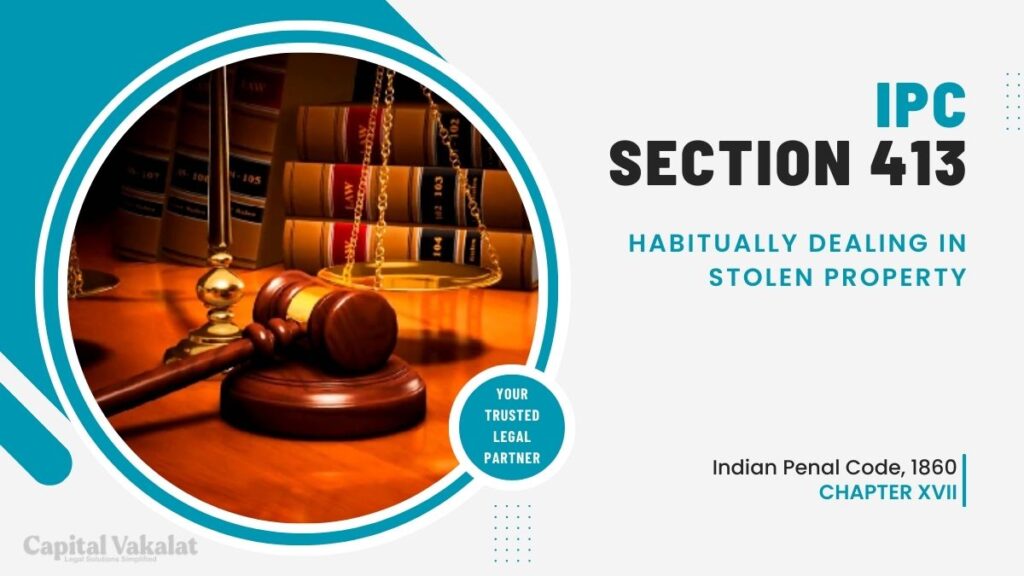In the realm of criminal law in India, Section 413 of the Indian Penal Code (IPC) holds a distinctive position, addressing the issue of habitually dealing in stolen property. This provision targets individuals involved in a repeated and organized manner in the trade of stolen goods, recognizing the severity of such offenses.

This article delves into the nuances of Section 413 IPC, shedding light on its definition, legal consequences, challenges in prosecution, preventive measures, societal impact, international perspective, recent developments, and expert opinions.
Understanding Section 413 IPC
Section 413 IPC outlines the legal repercussions for individuals who habitually engage in dealing with stolen property. To comprehend this section fully, it is essential to dissect its elements. The term “habitually” implies a repeated and continuous involvement in the trade, differentiating it from isolated incidents. The section aims to address not just occasional offenders but those who make a consistent business out of dealing in stolen goods.
Legal Consequences
Violating Section 413 IPC carries substantial penalties. Offenders may face imprisonment, fines, or both, depending on the severity of their involvement. Judicial precedents and case studies play a crucial role in shaping the interpretation and application of this section, showcasing the practical implications and outcomes of legal proceedings against habitual dealers in stolen property.
Challenges in Prosecution
Enforcing Section 413 poses unique challenges for law enforcement agencies. Gathering concrete evidence in habitual dealing cases can be intricate, requiring meticulous investigation. Issues related to the identification and valuation of stolen property further complicate the process, often leading to prolonged legal battles.
Preventive Measures
The effective implementation of Section 413 requires a collaborative effort. Law enforcement agencies must play a proactive role, employing strategies to curb habitual dealing. Simultaneously, community involvement and awareness programs can act as deterrents, discouraging individuals from participating in such illegal activities.
Impact on Society
Habitual dealing in stolen property not only poses a direct threat to individuals who fall victim to theft but also has broader societal implications. The economic consequences, coupled with the erosion of social trust, emphasize the urgency of addressing this issue. Public awareness campaigns and educational initiatives become pivotal in creating a united front against habitual dealing.
International Perspective
Comparing Section 413 IPC with similar laws in other jurisdictions offers insights into the effectiveness of India’s legal framework in combating transnational stolen property trade. Collaborative efforts on an international scale become imperative to address the global nature of habitual dealing.
Recent Developments and Amendments
To adapt to evolving challenges, Section 413 IPC has undergone changes over time. Analyzing recent developments and amendments provides a glimpse into the continuous efforts to enhance the legal framework surrounding the habitual dealing in stolen property.
Expert Opinions
Legal experts provide valuable perspectives on the efficacy of Section 413 IPC. Their insights, derived from practical experience, offer suggestions for improvements and highlight areas where the law can be strengthened to better serve its intended purpose.
Conclusion
In conclusion, Section 413 IPC serves as a crucial tool in combating the menace of habitually dealing in stolen property. Its multifaceted approach, encompassing legal consequences, preventive measures, societal impact, and international collaboration, underscores the comprehensive nature of this legal provision. As society evolves, so must the legal framework, and Section 413 IPC continues to be a dynamic instrument in the pursuit of justice.
Frequently Asked Questions
How does the term “habitually” distinguish offenses under Section 413?
The term “habitually” in Section 413 implies a repeated and continuous involvement in the trade, differentiating it from isolated incidents. The section targets those who make a consistent business out of dealing in stolen goods.
What challenges do law enforcement agencies face in prosecuting cases under Section 413 IPC?
Law enforcement agencies encounter challenges in gathering concrete evidence, as well as issues related to the identification and valuation of stolen property, making the prosecution of habitual dealers intricate.
What role does public awareness play in preventing habitual dealing in stolen property?
Public awareness is crucial in preventing habitual dealing as it acts as a deterrent, discouraging individuals from participating in such illegal activities. Community involvement and educational initiatives contribute to creating a united front against habitual dealing.
How has Section 413 IPC evolved over time to address changing challenges?
Section 413 IPC has undergone changes and amendments over time to adapt to evolving challenges. Analyzing these developments provides insights into continuous efforts to enhance the legal framework surrounding habitual dealing in stolen property.